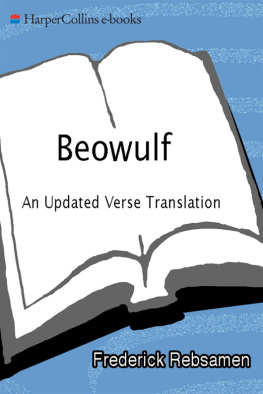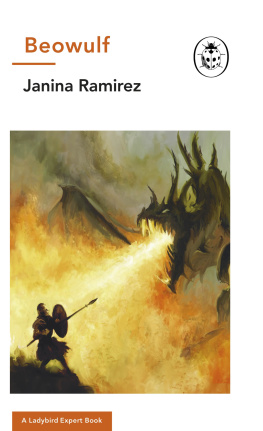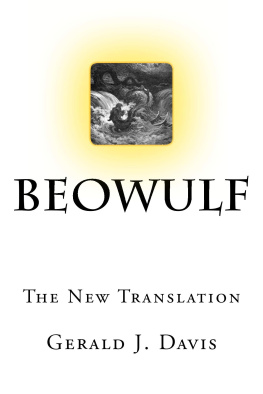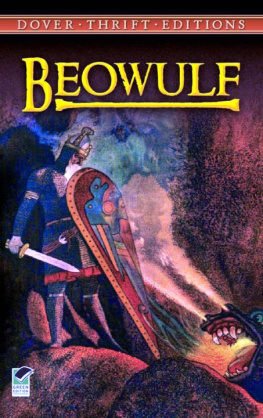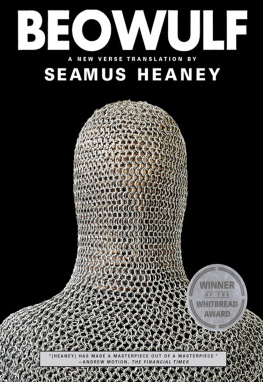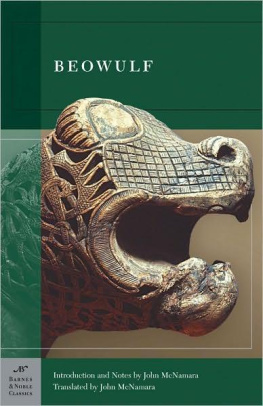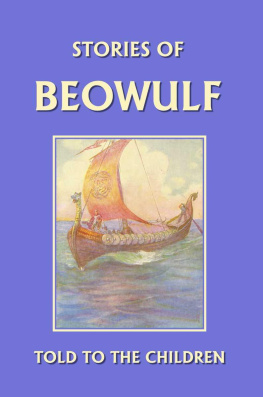
Contents

For advice, encouragement, and criticism, my grateful thanks to the following:
To Fred Robinson for telling me that, in constant search of the right words, I was neglecting certain matters of quantity and secondary stress. Though I have not been able to consistently capture all of the Old English forms after much revision of the manuscript, this translation is now much better than it might have been without that warning, and Beowulf scholars will note how I have profited by Freds intelligent essays clarifying several disputed passages.
To Dick Ringler and the five students in his Beowulf study group for spending an entire afternoon comparing a sample of my work with the original, an uncommonly generous response to my request for Dicks esteemed opinion of the translation, and for the fine encouragement of this perceptive group, which has given me a chronic boost.
To Joe Tuso, whose critical edition of Beowulf reflects his long acquaintance with the poem, for understanding what I have tried to do and for giving me the kind of strong and informed approval that every writer cherishes.
To Carl Berkhout for spending much time with his helpful advice on many subjects relative to this translation.
I am grateful to my editor, Cass Canfield Jr., for making this second edition possible, and to John Williams for seeing this edition through the press.
Especially to L. D. Clark, longtime friend and ruthless critic, who spent too many hours applying the skills of his acclaimed scholarly writing to three early drafts of the introduction and keeping me from making all kinds of silly mistakesthen giving praise to the poetry at a time when I needed it, along with unflagging encouragement from the first day of work to the last.
Finally, the greatest debt of all, to the anonymous poet who created this wonderfully conceived work of early medieval imagination and wrapped it in such ringing verses that I heartily wish all students of English literature could read it in the language in which he composed it. I find that I cannot improve upon my dedication of an earlier book on Beowulf: To the poet, whoever he was, whose song gave a richer light to that first bright flare of English civilization, this book is gratefully dedicated.

Except for a few small changes that need no introduction, I am concentrating upon improvement of the poetry in this edition. Alliteration (with a change in one initial sound) remains the same, and the other rules of Old English verse forms are followed as far as it is practical to do so in Modern English.
As in the first edition, although it is impossible to translate Beowulf line by line, nothing of any importance is omitted. Old English was a partially inflected language and a poet could therefore do things with word-order intolerable in Modern English, things that I have corrected for the sake of clarity. This has necessarily led me astray from the text in places, but I have always returned to the text and caught up with what I missed.
Again I have avoided a sprinkling of commas and semicolons, but I have used them, along with dashes, when necessary. The best way to understand this translation is simply to read slowly with pauses between verses when it seems natural. Too much punctuation would destroy the rhythm of Old English poetry.
I am grateful to my editor, Cass Canfield Jr., for making this updated edition possible.

In 1936, J. R. R. Tolkien delivered a lecture before members of the British Academy entitled Beowulf: The Monsters and the Critics. The wisdom and eloquence of this lecture finally delivered Beowulf from historians, archaeologists, mythologists, linguiststhe list is long. Conceding that students of all these disciplines can find much to ponder there, he said, however, that it is plainly only in the consideration of Beowulf as a poem, with an inherent poetic significance, that any view or conviction can be reached or steadily held, and further remarked that Beowulf is in fact so interesting as poetry, in places poetry so powerful, that this quite overshadows the historical content, and is largely independent even of the most important facts... that research has discovered.
In this translation of Beowulf the only translation I am aware of that attempts throughout to imitate the Old English poetic form as closely as is practical in Modern EnglishI have tried to respect those words in every line. However, because of the modern readers unfamiliarity with ancient Germanic poetry and Anglo-Saxon history, any translation should be prefaced by a discussion of those aspects of the poem which establish a matrix for the poets invention: the historical background, the principal characters, the structure of the poem, the dates of composition and of the manuscript, the source and importance of Beowulf, the poets compromise between Christianity and paganism, and a description of the Old English poetic form, as well as a few words about Beowulf himself and the three monsters.
Historical Background
Beowulf is a poem, a work of fiction, centered on Beowulf and his fights with monsters. Yet many historical/legendary characters and events are mentioned in the poem, and the Danes, Swedes, and Geats provide the necessary background for Beowulfs long and eventful life.
Both history and legend place the Danes and Swedes within the fifth and sixth centuries A.D., the North Germanic Heroic Age reflected in much of medieval Icelandic prose and poetry. The Danes lived in what is now Denmark and the southern tip of Sweden. Hrothgar, whose great hall was somewhere on the island of Zealand, is their king at the beginning of the poem, and the other members of that dynasty are accounted for in the course of the narrative. The Swedes, whose hostilities among themselves and against the Geats through three generations are featured in installments during the final third of the poem, lived in Sweden north of the great lakes, Vnern and Vttern.
The identity of the Geats remains obscure, though in this poem they must have lived in Southern Sweden, between the Danes and the two lakes, a territory I have referred to as Gtland in this translation. Gregory of Tours, who wrote his history of the Franks near the end of the sixth century, says that a king named Hygelac (Clochilaico in his Latin) conducted a raid in Frankish territory around the year 520. An anonymous eighth-century history of the Franks repeats this statement. So we may think of Hygelacs disastrous expedition up the Rhine, when we come to it in Beowulf, as having occurred around 520, and date the fictional events in the poem accordingly. Gregory and the anonymous historian identify Hygelac as a Danish king, but a third manuscript, the eighth-century Liber Monstrorum, written in England, says that Huiglaucus was king of the Getis. Exactly who these Getis were, and the Geats of Beowulf, has never been clearly determined.
Hygelac, whose sister was Beowulfs mother, is king of the Geats at the beginning of the poem, and at the end Beowulf has replaced Hygelacs son on the throne and ruled for fifty years. Beowulfs father, Ecgtheow, was a Waegmunding, a tribe unknown outside this poem. Wiglaf, who appears at the end of the poem as Beowulfs successor, is also a Waegmunding. There is no mention of Beowulfs wife (if he had one) or any descendants.
Next page
